Blog
Yorkie Sleeping Habits Through Their Life Stages
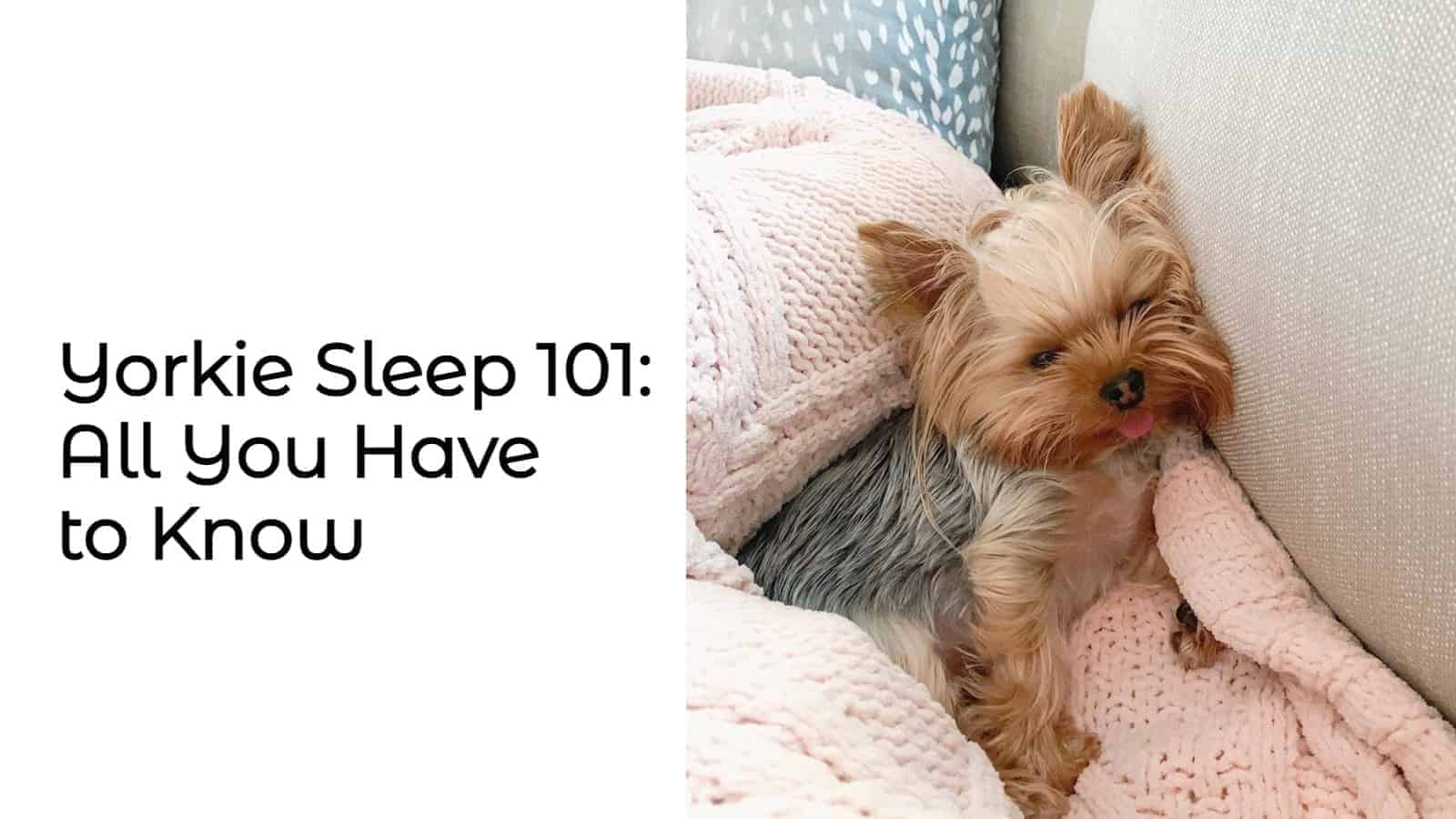
If you’re wondering how much sleep your Yorkie needs and what influences their sleep habits, understanding Yorkie sleeping patterns is crucial for their well-being. This blog post will help every dog owner who has just brought a tiny Yorkie pup home. Since quality sleep is important not only for us but also for our pets, we’ve provided you with some useful tips on how to teach your dog to have a sleeping routine.
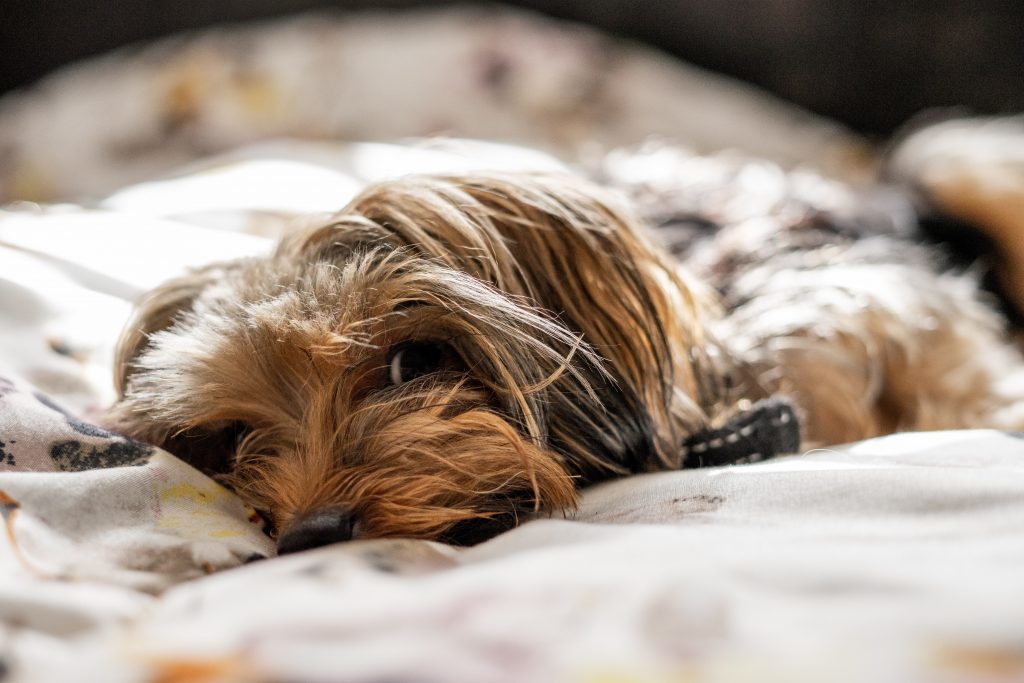
Yorkie Sleeping Habits Through Their Life
As Yorkies grow, their sleep patterns changes miltimple times. The amount of sleep a Yorkie needs, and the quality and timing of that sleep is determined by age, activity level, health and environment. As they move from one life stage to the next, owners need to be aware of the changes in their sleep habits to support them.
Sleep is also important for a Yorkie’s physical health, cognitive development and emotional well being. A sleep-deprived Yorkie will show signs of stress, anxiety or behavioral changes like irritability or restlessness. This guide will not only look at the hours of sleep required at each stage but also how lifestyle, training and daily activities affect sleep quality.
Understanding these variations allows owners to ensure their pets are well-rested and prepared to take on each day with energy and enthusiasm.
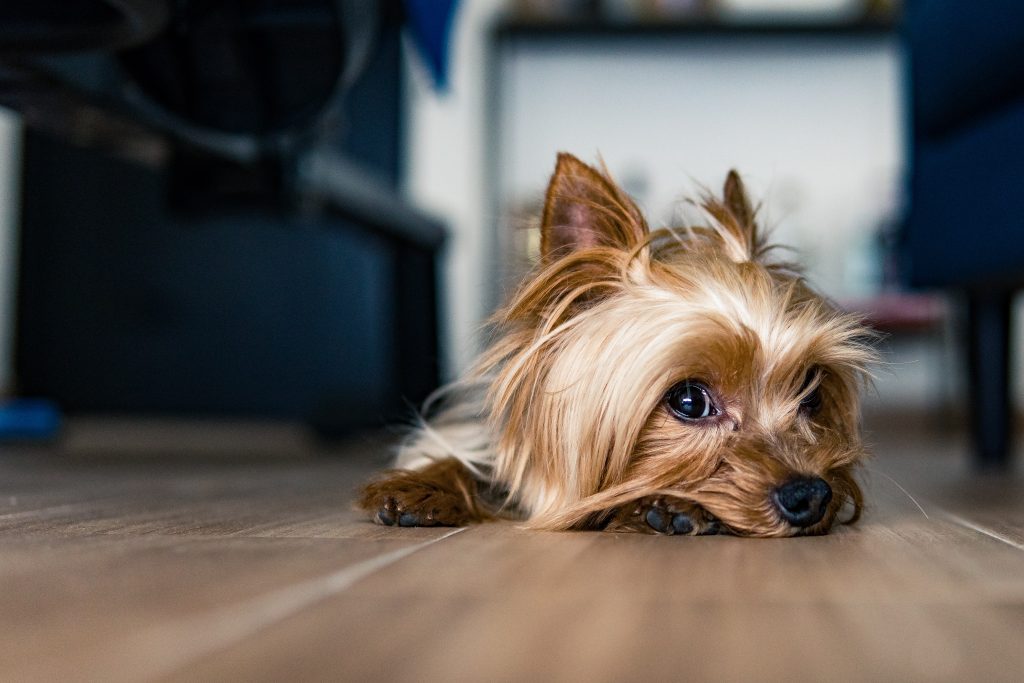
Yorkie Puppy Sleeping Routine (0-6 months)
Yorkie puppies are small energy bombs who loves to spend plenty of time playin. However, they also need lots of sleep – approximately 18-20 hours a day. This way, they support their rapid physical growth and mental development. Sleep is a big part of a puppy’s brain development as it consolidates new experiences, social interactions, and training. Without enough rest, Yrkshire terrier puppies can struggle to learn new commands or socialize properly.
Sleep Patterns
Puppies sleep in short bursts throughout the day and night. Their sleep cycles are irregular so they nap between play sessions. It’s normal for Yorkie puppies to wake up frequently especially at night as they adjust to a new environment. During this stage it’s also normal for puppies to have active sleep where they twitch or move slightly as they dream and process new experiences.
Tips for Supporting Puppy Sleep
- Create a Sleeping Area: Give your Yorkie a comfortable bed in a quiet spot to feel safe. Choose a bed with soft materials that can be washed.
- Establish a Routine: Feeding and bedtime schedules help regulate sleep patterns. A routine also helps the puppy know when to wind down.
- Nighttime Potty Breaks: You’ll need to take your puppy out at night as their little bladders can’t hold much.
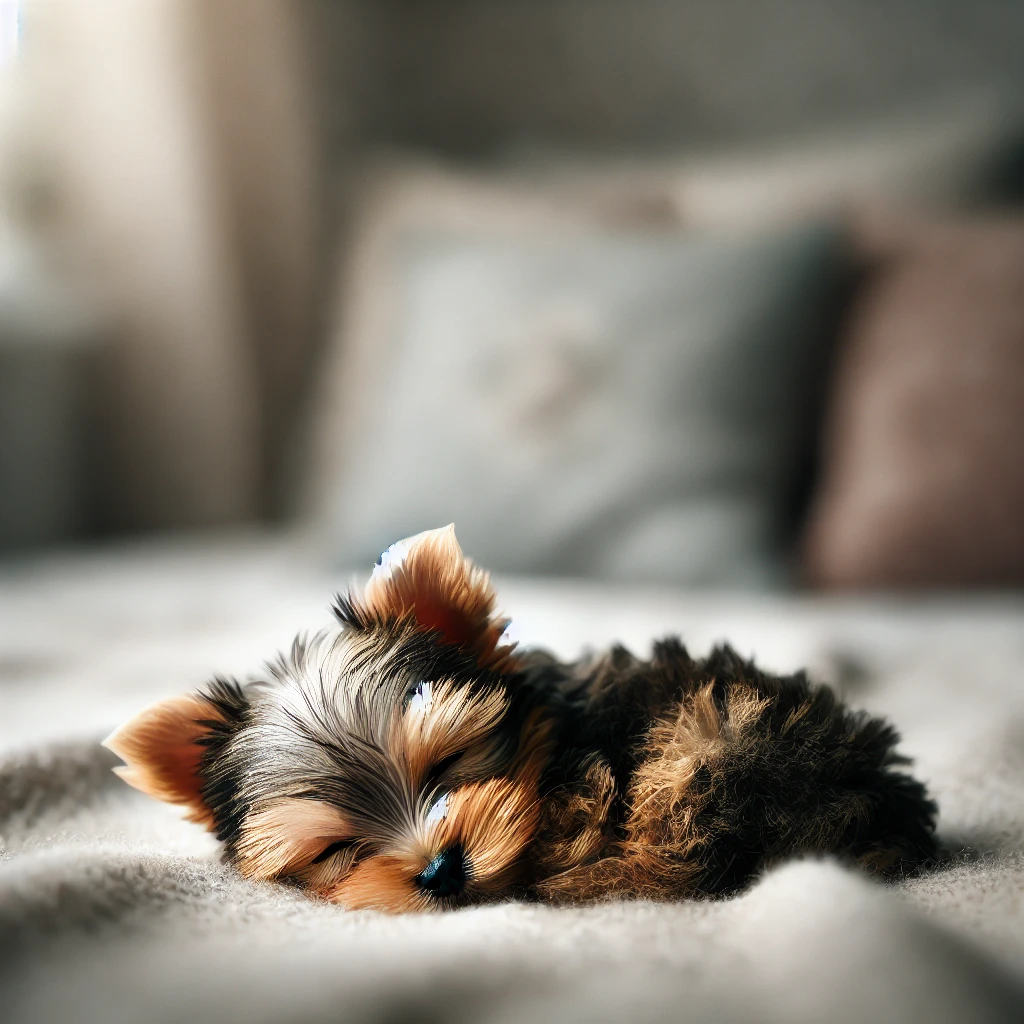
Adolescent Yorkie Sleeping (6 months – 2 years)
Yorkies need 14-16 hours of sleep a day during adolescence. They may be more active during the day, but sleep is still important to support their energy levels and development. This is a transition phase where the puppy is becoming a young adult. The mental and physical demands on adolescent Yorkies make sleep even more crucial as it helps with memory consolidation, and muscle recovery.
Sleep Patterns
Adolescent Yorkies will start to sleep more predictably, sleeping through the night and taking a few naps during the day. But bursts of energy and excitement can still disrupt sleep schedules.
Hormonal changes during this stage can also affect sleep patterns, making some dogs more restless or anxious, which in turn may interfere with their ability to settle down at bedtime.
Tips for Supporting Adolescent Sleep
- Increased Physical Activity: Engage in regular play and exercise to help your Yorkie burn off energy and sleep more soundly. Aim for at least two sessions of physical activity per day.
- Limit Stimulation Before Bedtime: Reduce exposure to exciting activities or toys close to bedtime to promote relaxation. Establishing a calming pre-bedtime ritual can help signal to your dog that it’s time to wind down.
- Comfortable Sleep Environment: Make sure the sleeping area remains comfortable, dark, and quiet. Noise-canceling curtains or a white noise machine may help if your dog is easily disturbed by sounds.
Adult Yorkie Sleeping Routine (2-8 years)
As adults, Yorkies sleep around 12-14 hours a day. Their sleep is split between nighttime and one or two daytime naps. Although their sleep needs decrease slightly as they get older, sleep quality is still key to their overall health. This is when they are most active and do most of their daily activities so they need to sleep to recharge their batteries.
Yorkie Sleeping Routine
Adult Yorkies develop a sleep routine and sleep longer and more consistently at night. They can adjust to their owner’s schedule but can become more lethargic if not mentally and physically stimulated. If your Yorkie is sleeping more during the day or more at night it could be a sign of underlying health issues or environmental stressors.
Tips for Adult Sleep
- Stick to a Schedule: Consistency is key for adult Yorkies to get the best sleep. Even small changes in schedule can affect their sleep.
- Watch for Changes in Sleep Patterns: Sudden changes in sleep could be a sign of underlying health issues like pain, allergies or anxiety.
- Mental Stimulation: Puzzle toys or training exercises can tire your dog out before bed. Interactive playtime not only burns energy but also keeps their mind sharp.
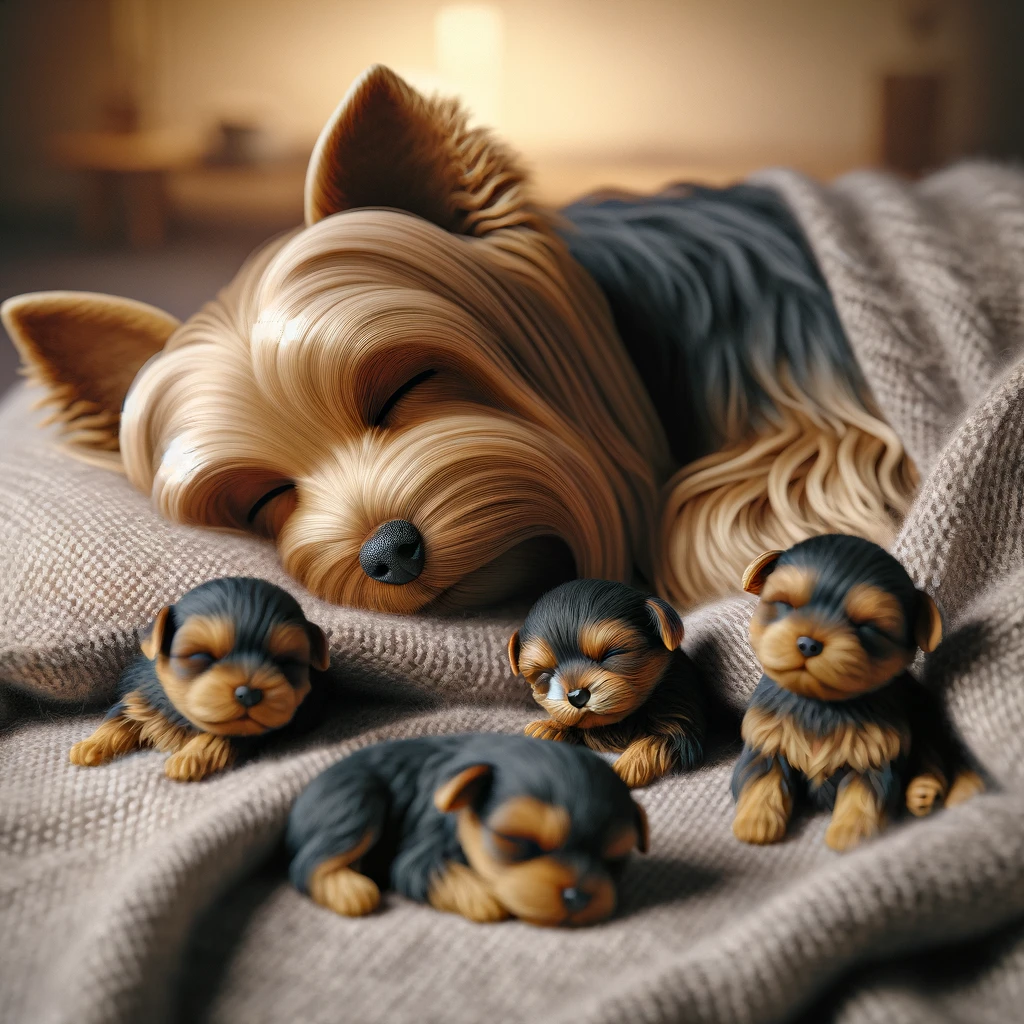
Senior Yorkie Sleeping Habits (8+)
As Yorkies get older they need more sleep again, around 14-16 hours a day. This is due to the natural aging process that slows down their metabolism and energy levels. Older dogs experience changes in their circadian rhythms and take more naps during the day. More sleep is needed to support their immune system, joint health and cognitive function.
Sleep Patterns of Senior Yorkshire Terriers
Senior Yorkies take more naps and wake up more during the night. They can be uncomfortable from conditions like arthritis that can disrupt sleep. Cognitive changes like confusion or disorientation can cause restless behavior at night. Age related changes in vision or hearing can make them more startled by their environment and affect their ability to sleep soundly.
Tips for Supporting Senior Sleep
- Orthopedic Dog Beds: Provide a supportive bed to reduce joint discomfort. Look for beds with memory foam or specialized cushioning.
- Regular Vet Check-ups: Health issues affecting sleep, such as arthritis or cognitive decline, can be managed better with early intervention. Your vet may recommend supplements or medications to aid in sleep.
- Gentle Exercise: Daily walks or light play help maintain mobility and tire your senior Yorkie out, promoting deeper rest at night.
Yorkie Sleeping: Cycles Explained
Yorkies, like most small breeds, are polyphasic sleepers, meaning they sleep multiple times a day and night rather than one big chunk. This is normal for dogs, they nap a lot especially when they’re not very active. Yorkies sleep about 12-14 hours a day, but can sleep 16-18 hours for puppies and seniors.
During their sleep, Yorkies go through two main stages: REM (Rapid Eye Movement) and non-REM sleep. REM is where dreams happen and is important for memory and learning, Yorkies enter this stage more often than bigger dogs because of their shorter sleep cycles. Non-REM is deep relaxation and helps with growth and cellular repair. The alternating stages allows Yorkies to be alert despite napping a lot, ready to respond to changes in their environment.
Tips to get a Yorkie Puppy to Sleep Through the Night
- Yorkie puppies tend to spend every waking moment running around and exploring, use this to play with it, and tire it down before bedtime.
- Yorkie puppies shouldn’t be allowed to eat food or drink water at least an hour before bedtime.
- Shortly before bedtime take your puppy to the bathroom, since an empty bladder will help add a few more hours of sleeping time before the next bathroom break comes.
- Dimmed lights and a peaceful environment will certainly help your Yorkie fall asleep faster.
- Toys should be removed from the crate or playpen where they sleep, though maybe keep a toy that makes Yorkie safe and aids sleep.
- Teach your puppy a command that means it’s bedtime, such as, ‘get in your bed’, so they will eventually go to bed at a command. Luckily, they are quite easy to train and remain disciplined.
- A blanket with the puppy’s mom’s scent is also helpful if you have received any from the breeder. You should put it into the puppy’s sleeping area.
- Yorkie puppies tend to fall asleep in your bed, however, this should be avoided, at least during the housebreaking and training periods. Instead, go for a quality dog bed.
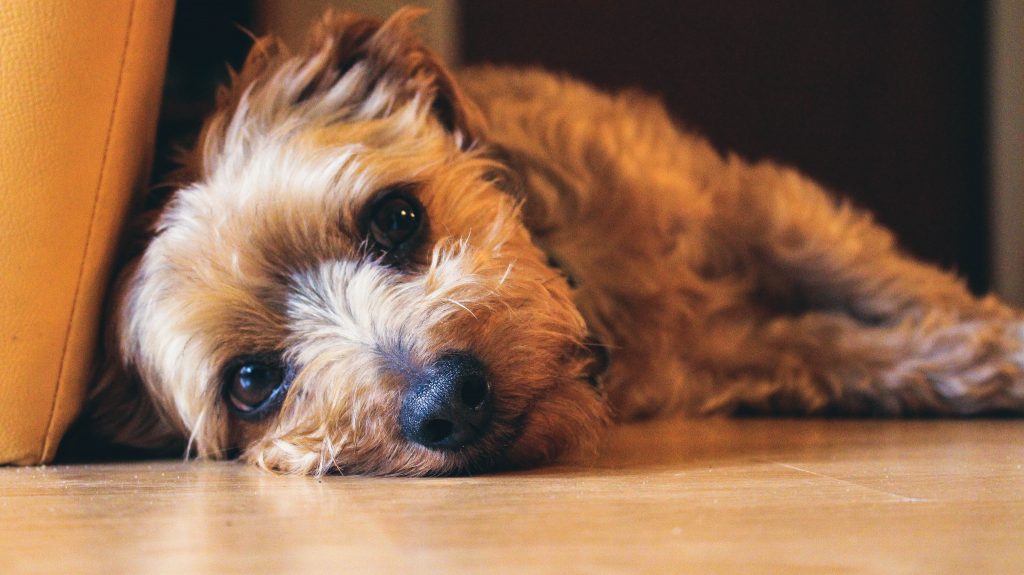
Yorkie Sleeping Routines Can Change During Their Lifetime
As the Yorkie becomes older, it will easily become adapted to your own sleeping schedule. However, during the colder months, Yorkies will tend to sleep more as the dogs prefer longer naps during the day in the cold weather. Well, who can blame them, bed is always warmer. The daily naps can last anywhere from ten minutes to an hour, depending on the environment. If there is something going on in the house, Yorkie will certainly awake at a tiny sound, and can sleep for an hour or so.
Adult Yorkies will be trained to your own schedule and will probably awake at the same time as you, or a few moments earlier to check the house before you awaken. Once awake, your pet Yorkie will probably need to go to the bathroom, so you should put off any walks or exercises for half an hour.
Furthermore, some Yorkies will need some time to adjust to the new day and come to full mind, before they are ready to start the day. Occasionally, they will need another hour or so of sleeping time.
Disturbance in Yorkie Sleeping Habits
Not everything is always perfect as dogs can be under stress or sick. A number of reasons can deteriorate the quality of their sleep and sleeping time, including increasing or decreasing it.
1. Sleep Apnea
One of the most frequent problems that cause disturbance in sleep habits is sleep apnea. Sleep apnea occurs when a Yorkie’s breathing repeatedly stops and starts during sleep. It can be caused by obesity, allergies, or respiratory issues. Signs to watch for include loud snoring, choking sounds, and frequent awakenings. Remedies may include weight management, using an elevated bed, or veterinary-prescribed treatments. Often seen in overweight dogs it also can affect any breed of any size. It causes a short burst of breathing obstructions, which then results in your pet dog waking up a few times during the night. Some medical signs that can point to sleep apnea include loud snoring and extra hours of sleep during the day.
2. Insomnia
Insomnia in Yorkies is less common but may occur due to anxiety, pain, or an inconsistent sleep schedule. Symptoms include difficulty falling asleep, frequent waking, or restlessness. Remedies involve ensuring a calming nighttime routine, addressing any underlying pain or health issues, and using natural calming aids like CBD or melatonin under a vet’s guidance.
3. Health Issues
Various diseases cause different problems in sleep habits, interrupting the routine when it comes to sleeping. Your dog will tend to sleep more if the body tries to fend off various diseases, saving energy for an internal fight. However, Yorkie can also sleep less due to the discomfort the disease provides.
Some diseases that can affect your dearest pet can range from worms to issues with the liver and even heart problems. Nevertheless, whatever is happening and you notice an issue, it is of utmost importance to take the Yorkie to a veterinarian’s office. If not taken to the vet, your pet could lose all the sleep time and start crying at night, waking you up, depriving you of the highly needed rest.
4. Too Much Activity Right Before Bed Time
It is not that smart to take your dog out for a walk just moments before bedtime. Also, it is not smart to expose it to any activities that will make it hard for them to settle down after it. Tend to take your dog out for a walk and playtime at least two hours before bedtime. That way Yorkie can get into a sleeping routine and it will have enough time to relax and unwind before it’s time to bark goodnight to you.
5. Age-Related Issues
Older Yorkies can develop a number of health problems, including arthritis which can affect sleep time. At times, it will become even difficult to fall asleep and find the right position. Nevertheless, medications and supplements can improve health status, while an orthopedic bed is also a plus. In case you’re searching for the right bed for your Yorkshire Terrier, then we recommend you to read our blog: How To Choose The Best Yorkie Bed?
6. Comfort
Consider getting a quality bed or crate for your pet dog as it will help in a great way to delete the chances of sleep disturbance. If you notice that the old one got worn out and the support damaged, consider buying a new bed for your pet Yorkie.
7. Restless Leg Syndrome (RLS)
Although rare in dogs, some Yorkies may exhibit signs of RLS, such as involuntary leg movements while resting. This condition is often linked to iron deficiencies or nerve issues. Signs include leg twitching or kicking during sleep. Treatment involves addressing nutritional deficiencies and, if necessary, consulting a veterinarian for additional therapies.
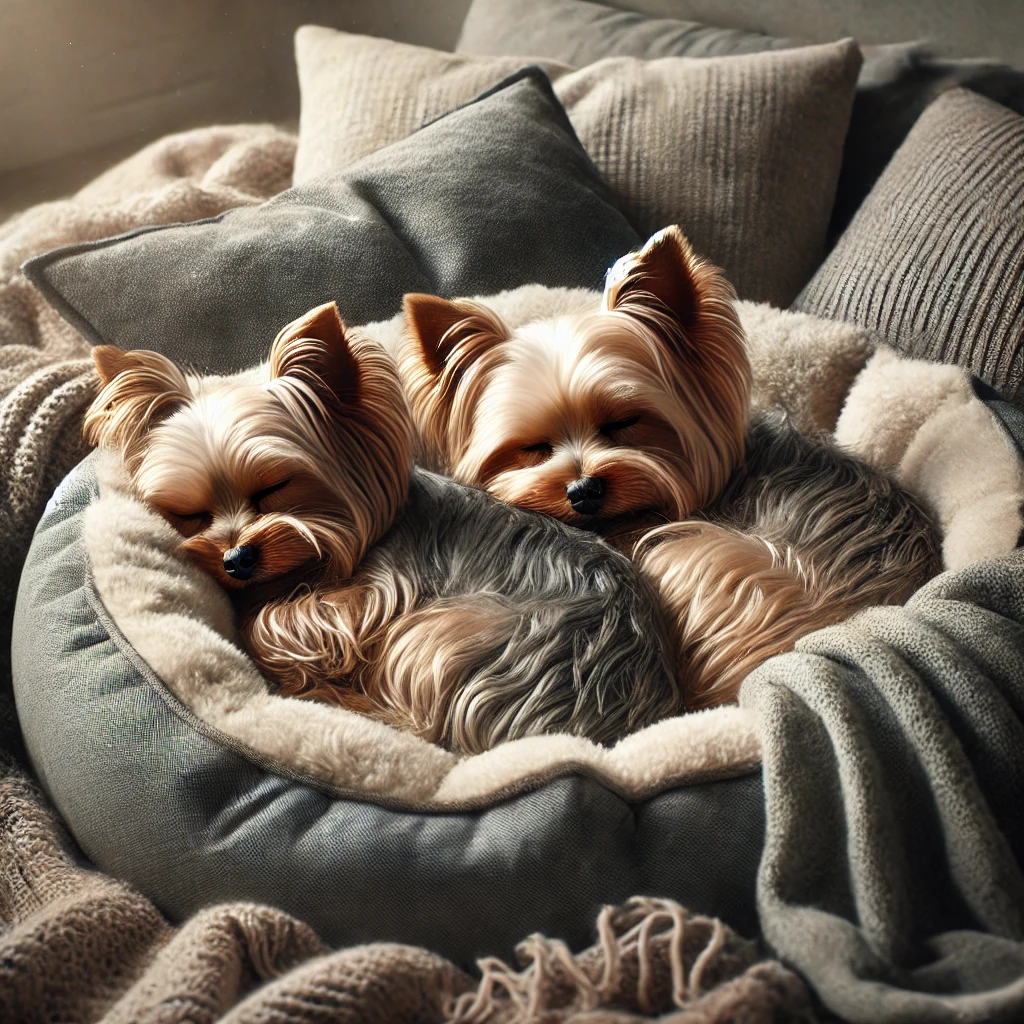
Where Do Yorkies Like to Sleep?
In addition to eating and playing, Yorkies love to sleep, which has become obvious to you so far. But where do they love to sleep and what do you need to provide for them so their sleep will be undisturbed.
Yorkies tend to fall asleep snuggled up next to you wherever you are, on a dining chair, bed, or a sofa in the living room. That is not a problem. Also, don’t be surprised if you find your pet under the blankets with you in the morning or on top of you. It is a privilege, not a curse. However, Yorkies have a few favorite locations:
- Warm corners
- Under low-lying furniture
- Under the covers of your bed
- Snuggled up against other pets
- On the favorite cushion, couch, or a blanket (check out our luxury yorkie couch)
To ensure your Yorkie gets quality sleep, it’s important to create a comfortable and secure sleeping environment.
Bed, Crate and Accessories
Choose a bed that fits your Yorkie’s size and has soft cushioning. Orthopedic beds are best for older Yorkies with joint issues. Crate training can also give your Yorkie a sense of security; choose a crate that’s big enough for your Yorkie to move around but not too big. Add blankets and toys for extra comfort.
Room Temperature, Lighting and Noise
Keep the room temperature between 68-72°F (20-22°C) for comfort. Dim lighting can signal bedtime, and reducing noise with white noise machines or quiet background can minimize disturbances. Create a peaceful and consistent sleep environment for your Yorkie.
How Does Separation Anxiety Affect Sleep Time in Yorkies?
Separation anxiety can affect Yorkie in many ways, creating numerous symptoms, which at worst can cause depression and even Yorkies eating their own poop.
Yorkies are quite prone to developing separation anxiety and even leaving them anywhere between two to four hours can cause the symptoms. This includes excessive barking, less bladder control, and destructive behavior, and scratching. All of this affects Yorkies sleeping time.
Prevention is the first thing to do and you should take small steps. At first, try leaving it for a few minutes and then start increasing the time period that you are not present in the house.
Once you have successfully completed this kind of training, for your pet’s sake do not return to the house to hug it and kiss it one more time once it starts barking. Ignoring your dog is the best way. Make sure that your dog has completed potty business while you were around and also ate in your presence.
Keep the essential toys near the dog so it can be something to be amused by while you are not around, and remove all other toys. In case your Yorkie still doesn’t have a favorite toy, you just might get him one right now.
Make sure your dog is not hungry
Furthermore, leave enough food and water in the pet’s area of reach in the house. Comfort and safety are the main ingredients.
Yorkies that sleep next to their owners tend to develop separation anxiety rather faster with stronger symptoms. Nevertheless, this can also be resolved. If you have fallen for their cuddly nature, you can start slowly moving them away, first from your bed and then from your room. Small steps are all that matter.
Once you have resolved issues of separation anxiety and your dog feels safe when you are not around you can let spend a few nights with you, but don’t let it get used to it. The problems can reoccur.
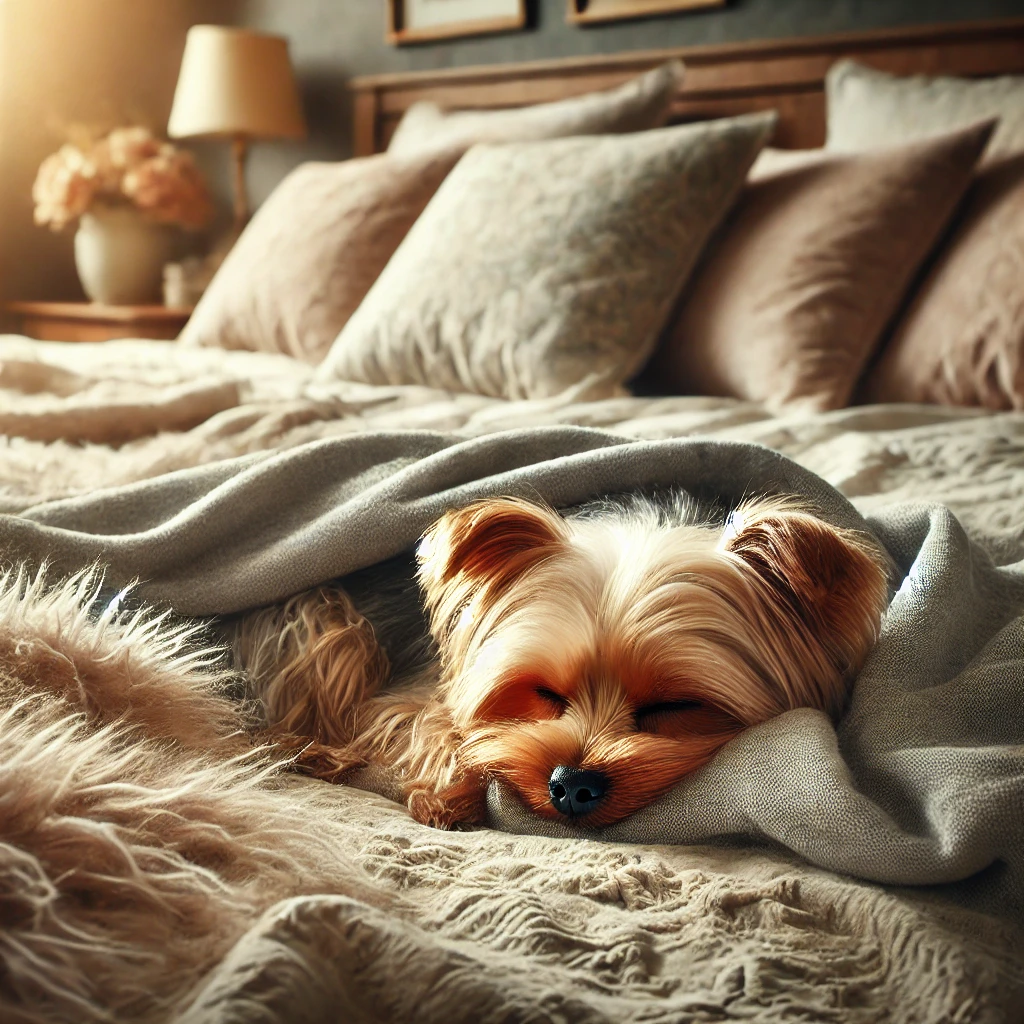
How to Calm a Yorkie Who Can’t Sleep?
Yorkies can develop different forms of anxiety due to their clingy personality and a vast quantity of energy. Nevertheless, there are a few ways to calm them down on a daily-basis and avoid bigger problems.
1. Calming Supplements
There are a few medications that work on a neurochemical level and some solutions are hemp extracts and essential oils. Some owners swear to the power of scent of lavender oil. Therefore, maybe you can place a nice essential oil diffuser in your home and monitor whether your Yorkie’s sleeping will get improved.
2. Tire them Out
Another way to avoid anxiety is to play with your dogs every minute you can. If you notice your dog full of nervous energy running out with no goal, you can turn that negativity into fun playtime. There are a few games that you can play with them and also provide them with numerous toys ideal for small dogs. For example, you can play a tug-of-war game or fetch game outside. These games will help them get pleasantly tired before sleep.
3. Full Attention
In order to calm your dog, you will need to give them your full attention. If they feel a lack of attention, it can then trigger anxiety attacks. In some cases, you can also put the crate in your room. But just on some occasions.
4. Safety and Comfort
As we mentioned, safety and comfort are the main keys to preventing your dog from developing any form of anxiety. Favorite toys, blankets, and other interesting things should be available at all times, so they feel safe and occupied. At some points, all they need is a bed or a cushion in the favorite corner of the room.
Yorkie Sleeping Routine: Wrapping Up
Yorkies sleep habits change as they go through life stages, from active puppies who need lots of naps to seniors who need more sleep to recover. By understanding these changes, you can support your Yorkie’s health and happiness at every stage. Pay attention to their sleep patterns and make adjustments as needed and your beloved pet will sleep soundly at any age.
Whether it’s the right bed, a routine or health issues, taking the time to make sure your Yorkie sleeps well will benefit them – and you – by improving their life.
